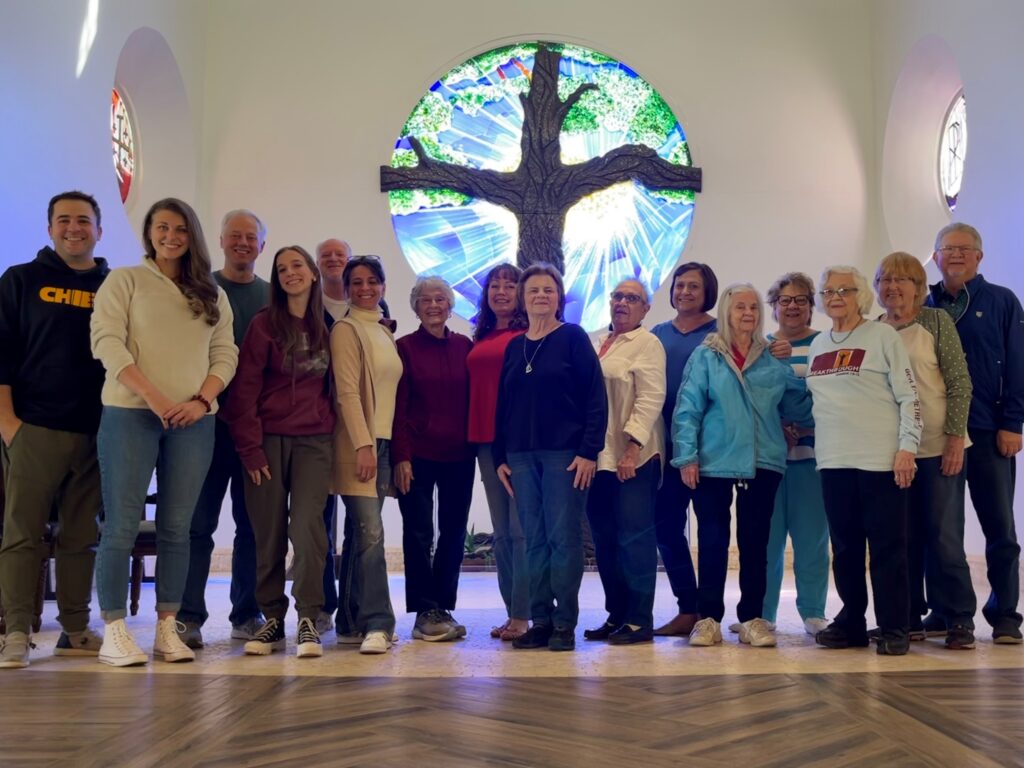We conducted our second GCR Breakthrough Retreat this past weekend at The Way Retreat Center here in Midland, 18 of us together for a concentrated time in the ancient Christian practices. Dwelling in the Word, praying Scripture, borrowed prayers, worship, communion meals, imaginative reading – we cram a lot into 22 hours. And it blesses me beyond my ability to articulate.
We tell people all the time to read their Bibles and pray. How do I become a better Christian? How do I grow in my faith? How do I feel closer to God? The answer is always to read your Bible and pray. But we rarely give Christ-followers the tools to truly engage our God through Word and Prayer. We don’t train our people on how to listen for the voice of God, how to hear his voice, how to discern his will, how to commune with the Father, Son, and Holy Spirit. Well, these time-tested, Church-proven practices are a God-send for those who are truly wanting to deepen their relationship with the Lord. And I love experiencing these times with other Christians.
You really get to know people in a hurry when you listen to them read Scripture and pray. You see so clearly what’s in their heart, you understand their souls, when you hear them read the ancient words and recite them back to God. Their stories just come out – their heartaches, their desires, their joys, their past, their hopes. I see God differently when I hear my sisters read the Word and pray out loud. I understand different facets of his love and mercy that I would never get on my own without their unique sensibilities. I praise God for my sisters in Christ who share their faith with me and with others in these powerful ways.
We want everybody at GCR Church to experience one of these retreats over these two years. The next two are set for June 9-10 and September 15-16.
~~~~~~~~~~~~~~~~
We are in the beginning stages of a shepherd selection process at GCR and, in some ways, a restructuring of our church eldership. We laid out the process yesterday for adding additional elders to our church family, along with some explanation for the three major changes to our church leadership structures. Allow me to walk through the highlights here.
The three main changes which will take place during this selection process are these:
1) Shepherds will be ordained for three-year commitments
2) Shepherds will take a mandatory one-year sabbatical after serving two three-year cycles
3) There will be no congregational vote at the end of the selection process
There are two main reasons for these changes. One, we want to make the on-ramps and off-ramps to the eldership wider and smoother. Typically, in Churches of Christ, there are only two ways to leave the eldership: mad or feet first. A Church of Christ elder has usually understood his role as a lifetime appointment. We believe a commitment to a three-year cycle is a lot less daunting than signing up for the rest of one’s life. The three-year stint provides a way out, too. If a shepherd decides, for good reasons, that it’s best for him to step away, he can do that after three years. It’s built into the system. Nobody’s upset, nothing’s wrong, nobody did anything – he completed his commitment, he did what he said he would do, he did everything we asked him to do. Seeing a clear way in and out makes it more likely that our gifted men will answer the call. And it also prevents against shepherds serving in this important role out of a sense of duty or expectation after they’ve run out of energy or effectiveness.
Two, healthier shepherds will result in a healthier church. We are adding expectations that our elders will undergo continuous education by attending ElderLink conferences and other such seminars. All shepherds will be expected to participate in spiritual leadership training at GCR, the details of which are being worked out now. The mandatory sabbaticals will allow our shepherds to pay closer attention to their own relationships with the Lord, to reconnect with the life of the congregation, to re-engage a favorite ministry, to read a book or two, and to attend to servant leadership development and spiritual renewal. It gives them an opportunity, away from the urgency of the position, to evaluate their continued calling in a healthy way.
Regarding the confirmation vote at the end, we’re doing away with it. The words “vote,” “election,” “counting votes,” and calculating “percentages” form us much more according to our culture than to the Gospel. We’re not using words like that anymore. We’re also staying away from words like “nominate,” “nominee,” “ballot,” and “candidate.” In a nod to the past, it seems preferable to use Bible names for Bible things. The church will recommend shepherds at the front end of the process and we will trust God’s Spirit to speak through his people to reveal to us our new elders.
Once the prospective elders are presented to the congregation, there will be three weeks of biblical accountability for the congregation to voice any concerns. But there will be no vote. If there are any issues between folks, we want those resolved in community. We want accountability to be handled in relationship, not with a check mark on a piece of paper. If someone feels strongly that one of the men selected should not be one of our shepherds, that person should go to that guy and work things out. If they can’t work it out and the person is still convicted that for biblical and theological reasons this man cannot serve as a shepherd, then it needs to be brought up with the current elders. But don’t go to the elders first. Go to the guy you have the issue with.
We detailed all the changes in last week’s GCR Family Update which you can access here. I also preached on this yesterday in a sermon you can watch here.
I’ll be spending a lot of time on elders and shepherd selection in this space for the next several weeks as we engage the process here at GCR. May our Lord bless us with wisdom and guidance.
Peace,
Allan


Leave a Reply